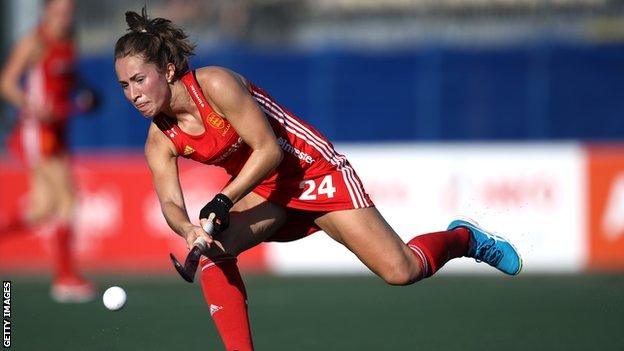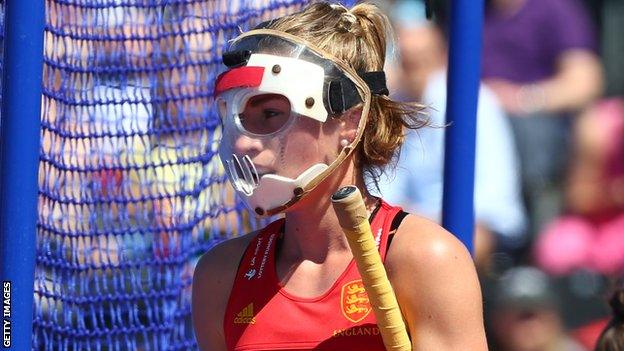Shona McCallin: Olympic gold medallist on effects of 'brutal' concussion
- Published
Shona McCallin on her struggle with concussion
2018 Hockey Women's World Cup |
|---|
Venue: Lee Valley Hockey and Tennis Centre, Queen Elizabeth Olympic Park, London Dates: 21 July-5 August |
Coverage: Reports on England and Ireland matches on the BBC Sport website; BBC Radio 5 live sports extra commentary on selected matches - full details & fixtures here |
"There have been times where I've been looking down a dark tunnel and there is no light at the end."
Like most elite athletes, Olympic gold medal-winning hockey player Shona McCallin has had her fair share of injuries. But concussion, she says, is "far and away the worst".
Playing for England against Argentina in February, the 26-year-old took an opponent's shoulder to her head. Headaches, sickness and a sensitivity to light and sound rapidly developed, and despite being initially told she would only be out for two to four weeks, she has still not returned to full-time training.
She is one of three players - along with England team-mate Nicola White and the Netherlands' Pien Sanders - who will miss the World Cup, which starts on Saturday, because of concussion.
"Concussion is like a game, but not a very fun game," McCallin told BBC Sport. "It takes over your whole life.
"It's a brain injury, so you can't mess around with it."
So is enough being done? Are athletes aware of its seriousness? And should the sport's governing bodies be considering more action to prevent such injuries by introducing headwear?
What is concussion?
Concussion is a temporary injury to the brain,, external usually caused by a bump, blow or jolt to the head.
Symptoms, like those experienced by McCallin, can include headaches, nausea, and balance issues, as well as dizziness, confusion, changes in vision and unusual behaviour.
McCallin's symptoms developed almost instantaneously, and when she was substituted she veered left and right as she ran off the pitch despite believing she was moving in a straight line.
"I got really angry when I was told I wasn't going back on, which I know now is a sign of concussion," says McCallin, who had headaches every day for four months as a result.
"I went to warm down with the girls and I couldn't run, my co-ordination had just gone. I found it hard to just talk. I couldn't think and engage my brain and get my words out.
"As soon as I heard the word concussion, I knew I wasn't playing any more on that trip."
'Like a hangover in handcuffs'

McCallin is yet to return to full-time training after she was concussed in February
McCallin missed April's Commonwealth Games - where England won a bronze medal - and will have to sit out the World Cup.
But while she admits missing such tournaments is "horrible", she says the "brutal" impact on her personal life has been just as great.
"They are huge tournaments and ones you want to go to as an athlete, but what is worse is the control concussion has over your life," she says.
"You don't know how it is going to affect you each day, how you're going to wake up or if it's going to be a good or bad day."
McCallin, who won European gold with England in 2015, does not yet know when, or indeed if, she will return to full-time training, but says the past five months have given her "more perspective on life".
"Concussion is overwhelming and relentless, you just can't get away from it sometimes. It feels like a hangover in handcuffs - you don't have the freedom to do what you want," she says.
"There have been times where I have thought, 'am I going to be able to live a normal life? Am I going to be able to get rid of this?'
"Hockey isn't everything, there are bigger things in life, and this has really cemented that in my mind."
'The onus is on the player'
During her recovery McCallin has met former rugby players who, after retiring, still experience side-effects from concussions they suffered during their playing careers.
It has led to her wanting to raise as much awareness about the injury as possible, admitting she was previously "naive" about it.
"All I want is to raise awareness of concussion and educate people more because the actual onus is probably on the player initially to tell medical teams," McCallin says.
"I could have hidden the fact I had a headache, so it's about educating people to understand the consequences of hiding it and the seriousness of it."
Luke Griggs, of brain injury association Headway, told BBC Sport incidents of concussion are often "unreported", meaning experts do not know the "extent of the problem" in sport.
"Either people don't understand it and the risks of continuing to play, or they choose not to take themselves off and be assessed," said Griggs, who experienced concussions himself as a hockey player.
"Hockey is progressive. It is trying to evolve and improve things and that is great, but is enough being done?"
'There will be concussions at this World Cup'

Players wear masks when defending penalty corners but remove them once the move has ended
While hockey goalkeepers wear head-to-toe protection including helmets during games, outfield players only put on masks for penalty corners.
There have been calls for players to wear head protection throughout games, but the International Hockey Federation (FIH) says there are "no imminent plans" to make changes - and McCallin thinks it would have made little difference in her case.
"I think if I had been wearing a headpiece, I still would have got a concussion," McCallin says.
English Institute of Sport physiotherapist Matthew Davies, who works with England Hockey, told BBC Sport playing hockey provides "no extra risk" of concussion than other sports.
He said: "Inevitably, if someone runs into you and hits you in the head, I'm not sure we can prevent concussion.
"There's not a lot of evidence that would support the use of helmets in preventing concussion."
At this summer's football World Cup in Russia, Morocco were criticised for playing winger Nordin Amrabat five days after he suffered a concussion.
Griggs says there will "undoubtedly" be concussions at the hockey World Cup in London, but hopes the sport will "set a better example" than football.
"Greater awareness is happening all the time, and you can't take every risk out of life and out of contact sport," he says.
"The information needs to be out there that if a concussion happens, people need to acknowledge it, act accordingly, and take the 'if in doubt, sit it out' approach."